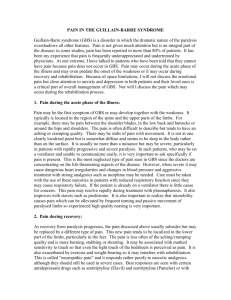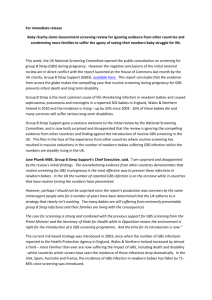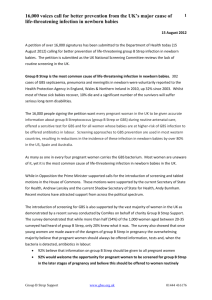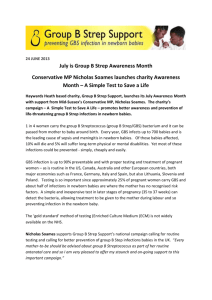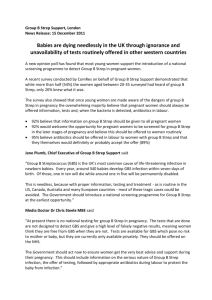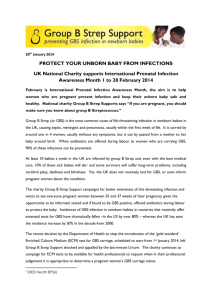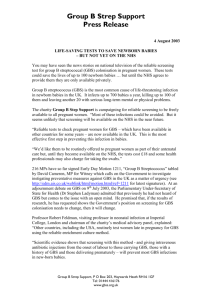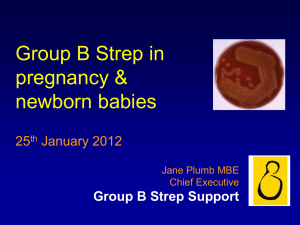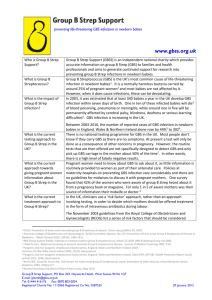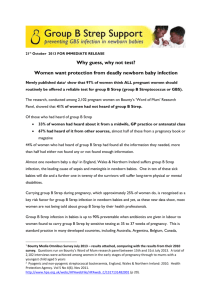GBSS launches new report calling for routine screening
advertisement
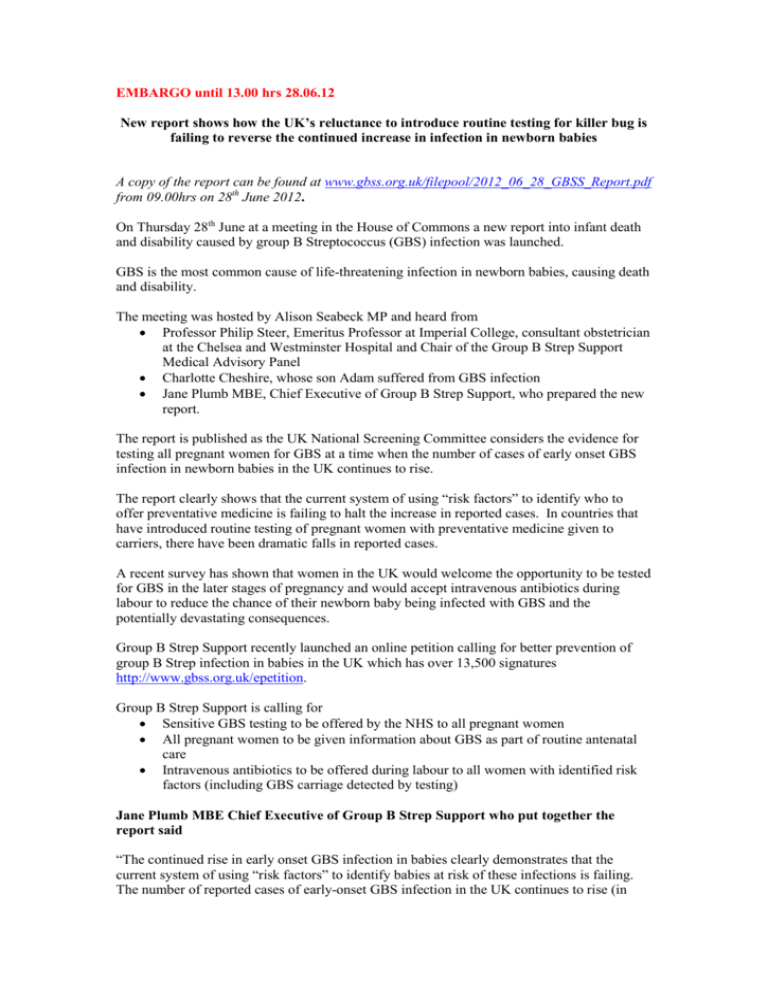
EMBARGO until 13.00 hrs 28.06.12 New report shows how the UK’s reluctance to introduce routine testing for killer bug is failing to reverse the continued increase in infection in newborn babies A copy of the report can be found at www.gbss.org.uk/filepool/2012_06_28_GBSS_Report.pdf from 09.00hrs on 28th June 2012. On Thursday 28th June at a meeting in the House of Commons a new report into infant death and disability caused by group B Streptococcus (GBS) infection was launched. GBS is the most common cause of life-threatening infection in newborn babies, causing death and disability. The meeting was hosted by Alison Seabeck MP and heard from Professor Philip Steer, Emeritus Professor at Imperial College, consultant obstetrician at the Chelsea and Westminster Hospital and Chair of the Group B Strep Support Medical Advisory Panel Charlotte Cheshire, whose son Adam suffered from GBS infection Jane Plumb MBE, Chief Executive of Group B Strep Support, who prepared the new report. The report is published as the UK National Screening Committee considers the evidence for testing all pregnant women for GBS at a time when the number of cases of early onset GBS infection in newborn babies in the UK continues to rise. The report clearly shows that the current system of using “risk factors” to identify who to offer preventative medicine is failing to halt the increase in reported cases. In countries that have introduced routine testing of pregnant women with preventative medicine given to carriers, there have been dramatic falls in reported cases. A recent survey has shown that women in the UK would welcome the opportunity to be tested for GBS in the later stages of pregnancy and would accept intravenous antibiotics during labour to reduce the chance of their newborn baby being infected with GBS and the potentially devastating consequences. Group B Strep Support recently launched an online petition calling for better prevention of group B Strep infection in babies in the UK which has over 13,500 signatures http://www.gbss.org.uk/epetition. Group B Strep Support is calling for Sensitive GBS testing to be offered by the NHS to all pregnant women All pregnant women to be given information about GBS as part of routine antenatal care Intravenous antibiotics to be offered during labour to all women with identified risk factors (including GBS carriage detected by testing) Jane Plumb MBE Chief Executive of Group B Strep Support who put together the report said “The continued rise in early onset GBS infection in babies clearly demonstrates that the current system of using “risk factors” to identify babies at risk of these infections is failing. The number of reported cases of early-onset GBS infection in the UK continues to rise (in England, Wales and Northern Ireland, by 32% since the risk factor strategy was introduced in 2003) while, in countries that introduced routine testing, the numbers have fallen dramatically. The evidence from across the globe in favour of introducing routine testing is compelling and I hope and believe that the National Screening Committee will reach the same conclusion and recommend that routine testing is introduced across the UK. We are delighted by the level of support we have received from politicians, this includes the Prime Minister David Cameron who, while in opposition, tabled motions in parliament in support of testing for GBS.” Professor Philip Steer, Emeritus Professor at Imperial College said “Group B Strep infection is the commonest infection complicating labour and the newborn period, and the evidence is now compelling that in the UK the problem is increasing, affecting up to as many as 1,000 babies (and their families) per year. For too many, the complication is fatal. This is despite reductions of four fifths or more in the rate of infections due to GBS in many other developed countries, where routine screening of mothers at 35-37 weeks gestation has been introduced. Although the National Screening Committee has previously declined to advise screening because of a lack of UK studies showing effectiveness, we hope that the accumulated evidence from so many other developed countries will persuade them that it is now time to introduce screening in the UK.” Media Doctor, Dr Chris Steele MBE said “At present there is no national testing for group B Strep in pregnancy. The tests that are done are not designed to detect GBS and give a high level of falsely negative results, meaning women think they are free from GBS when they are not. Tests are available for GBS which pose no risk to mother or baby, but they are currently only available privately. They should be offered on the NHS. The Government should act now to ensure women get the very best advice and support during their pregnancy. This should include information on the serious nature of Group B Strep infection, the offer of testing, followed by appropriate antibiotics during labour to protect the baby from infection.” Charlotte Cheshire from Telford and parent of Adam, said “The consequence of group B Strep infection is devastating. When my son Adam was born in March 2011 he appeared a healthy little boy. However, by the morning after his birth he was grunting and not feeding and the staff realised something was wrong. Adam stopped breathing, began to have seizures and was running a high fever. He was placed on a cocktail of antibiotics while the staff confirmed the diagnosis of group B strep infection. We were told he was not expected to live and, if he did survive, he could be severely disabled. Adam survived but was in intensive care for three weeks and will require intensive, ongoing monitoring throughout his childhood. At present, Adam’s identified long term issues are severe hearing damage and problems with his sight, but it could have been so much worse. Yet all this could have been averted – if I’d had a sensitive GBS test late in pregnancy, it would almost definitely have found GBS and, with antibiotics from the start of labour, Adam could have been protected. I am Canadian and if I had chosen to have Adam in my native country, sensitive testing for GBS is routine as it is in many other western and European countries and we could have avoided the distress, trauma and consequences of GBS infection. I believe a national programme should be introduced as soon as possible to reduce the number of families that have to suffer the horrors of GBS infection in their newborn babies. I am calling on every politician in the land to demand that the health services in the UK act now and offer screening to pregnant women against this life threatening infection.” Contact: Jane Plumb, Chief Executive, Group B Strep Support for comment or to contact families affected by group B Strep. Case studies and photographs are available upon request. Tel: Mobile: e-mail: 01444 416176 07986 745387 (for your use only, please don’t publish) jplumb@gbss.org.uk Notes to editors: GBSS is a UK charity set up in 1996 to prevent GBS infection in newborn babies. GBS is a normal bacterium carried by up to 30% of adults. It can be passed from mother to baby around labour. This causes no problems for most babies: for others can be deadly, causing blood infection, pneumonia and meningitis. GBS is the most common cause of life threatening infection in newborn babies. In the England, Wales & Northern Ireland, the incidence of these infections has increased by almost 50% since the introduction of the Royal College of Obstetricians & Gynaecologists prevention guidelines in 2003 (http://www.rcog.org.uk/womenshealth/clinical-guidance/prevention-early-onset-neonatal-group-b-streptococcal-diseasegreen-). Data sourced from annual CDR/Health Protection Reports found on www.hpa.org.uk/Topics/InfectiousDiseases/InfectionsAZ/StreptococcalInfections/Epide miologicalData/ Newborn babies are at higher risk of developing GBS infection if there are certain ‘risk factors’ present during the pregnancy, labour and delivery. These are: Mum carrying GBS during the current pregnancy, Mum having a GBS urinary tract infection during the current pregnancy, a previous sibling having developed GBS infection, Mum’s waters breaking more than 18 hours before delivery, labour starting or waters breaking before 37 completed weeks of pregnancy and Mum having a fever in labour. ComRes interviewed 1,000 20-35 year old women in the UK online between 28th October and 1st November 2011. Data was weighted to be demographically representative of 2035 year old women in the UK. The full data tables are available at www.comres.co.uk. A few NHS trusts make sensitive testing for group B Strep available to pregnant women at the request of their health professionals, but most don’t. A number of private medical laboratories do – packs containing the necessary swabs are supplied free, with the postal service for carrying out the test costs around £35. See http://www.gbss.org.uk/test for the availability of sensitive testing following the Health Protection Agency’s BSOP58 from private laboratories. GBSS has no links/ receives no money from any laboratory. Group B Strep Support provides information and support to families and health professionals affected by GBS. It is the UK’s only charity dedicated to the prevention of group B Strep infection in newborn babies and provides comprehensive and reliable information on group B Strep, both printed and online. Group B Strep Support is supported by an independent medical advisory panel http://tinyurl.com/GBSS-MAP. Dr Chris Steele MBE - Resident doctor, ITV's This Morning, 2007 Health Journalist of the Year, 2010 Lifetime Achievement Award, Guild of Health Writers http://www.drchrisconfidential.com GBSS recently launched a petition calling for better prevention of group B Strep infection in UK babies http://www.gbss.org.uk/epetition (or http://epetitions.direct.gov.uk/petitions/4854)
